Classic
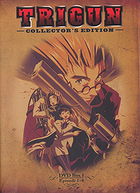 Posted : 14 years ago on 2 January 2012 04:05
(A review of Trigun)
Posted : 14 years ago on 2 January 2012 04:05
(A review of Trigun)I have to admit, I went into Trigun not expecting much from it.
I had only seen bits of pieces, and from the little I had heard about it, it was a silly action comedy. I had always wanted to see it just for the hell of it, thinking that it would be stupid but at least enjoyable.
But man, I had no clue. After the complete tonal shift around episode 12, I knew I had gotten myself into a much bigger show than I was expecting.
But let's start from the basics: how it looks and sounds.
I'm not much of a stickler for the more technical details, so it doesn't ruin a show for me, but there were some technical aspects of the show that got distracting. The animation ranges from being average to choppy. It cuts quite a few corners at times, especially in action scenes and through reusing flashbacks. Also, proportions and backgrounds are sometimes off, as well as unreliable character models. If you're a snob for animation quality, this may bug you more than me. All in all, I guess it is acceptable for a late 90s anime.
However, the sound design (which I am totally snobby about) is wonderful. It has one hell of an amazing rock, bluesy, occasionally avante-garde soundtrack by the always amazing Tsuneo Imahori of Seatbelts fame. The dub is quite good, especially by Johhny Yong Bosch, who in my opinion outshone the original seiyuu. Some of the minor characters are a bit hammy, but all of the major characters do an amazing job, and many of the more dramatic moments are made 10x better by the voice acting alone. (I haven't watched much of the original Japanese yet. What can I say, I'm a sucker for dubs.)
What really shines here are the characters. The characters are among some of the most sympathetic and interesting I have seen. I was surprised at how much I cared for them so early on in the story, and that in itself is a sign of great character development. Vash in particular is an incredibly fascinating and well-rounded individual that definitely does not fit into the typical hero archetypes. Even though he scores a mighty 50-72(!!) on the Mary Sue Litmus test, he somehow works.
The other mains (Meryl, Milly, Wolfwood, Legato, Knives, Rem) are fascinating, 3 dimensional characters as well. In fact, it has influenced me to go out and buy the manga because I want to know as much about them as I possibly can. To me, characters are the most important aspect of storytelling, and Trigun more than masters the art.
The exploration of different moral philosophies is tastefully done and well thought out. It never feels like its preaching, and thank god for that because it could have gone wrong in many ways. The Biblical references are subtle and well done, however some people may find Wolfwood's gigantic cross-gun offensive. (I personally think it's fucking awesome, but moving on...) But I'm not going to pradle on about that because philosophy and all that jazz isn't really my trade (obviously).
The drama that occurs more in the latter half of the series is especially poignient and tear-jerking. I don't usually like using vague terms, but the show has a lot of heart and spirit to it. Even when mass populations are killed off, it never seemed heartless or without a point to the plot.
Because I want to keep the review relatively spoiler free, I'll stop there. All in all, it has actually become one of my favorite series I have ever watch, and trust me when I say that I was not expecting that.
 0 comments, Reply to this entry
0 comments, Reply to this entry
Comparison to the first Fullmetal Alchemist
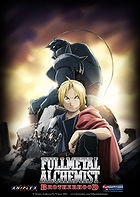 Posted : 14 years, 3 months ago on 12 October 2011 12:46
(A review of Fullmetal Alchemist: Brotherhood)
Posted : 14 years, 3 months ago on 12 October 2011 12:46
(A review of Fullmetal Alchemist: Brotherhood)Yes, yes, the inevitable comparison between Fullmetal Alchemist series and Fullmetal Alchemist: Brotherhood. (Let's refer to the first series as Fullmetal Alchemist and the second series as just Brotherhood.)
I know that there are a lot of people out there drawing comparisons between the two these days, and dammit, here's one more.
This is a difficult comparison for me. Brotherhood stands out as being the much higher quality anime, with much better animation, better character origins and less glaring plot wholes.
But Fullmetal Alchemist, even with it's sometimes nonsensical parts, has touched me in a much more profound way. Even with its rushed ending and completely different story arc from the source material, Fullmetal Alchemist stands out as being the more emotionally engaging and unique experience. However, I may also be biased because the first series was my first anime that I watched on its original run when I was 11.
While Brotherhood is certainly an emotionally charged, heart-warming series as well, there is something that I can't really explain about the first series that just hits the right chord with me.
One of the things I noticed was that the comedy was much more present in Brotherhood, which, in my opinion, hindered the drama at many points. Granted, it was funny as hell, but really ticked me off at times. From what I understand, this is closer to the source manga in which Edward and Alphonse are much more closed off emotionally and more hesitant to become sentimental compared to the first Fullmetal. While this does follow the original author's intentions, the few moments that break this mold in Fullmetal Alchemist are among some of the most poignent I have ever seen.
The only two major characters that had differences worth discussing are Ed and Al.
The Ed in Fullmetal Alchemist is much more realistically immature and weak at times, though admitedly his cocksure attitude can be more annoying than charming at times. The Ed in Brotherhood is still cocksure, but he is more humorous. Though I think he is stronger-willed in Brotherhood, there's also a part of him that seems more compassionate. But there is also something in him that seems also psyhotic and pathetic. It's difficult to explain, but goes without saying that the Brotherhood Ed has more depth.
What I can't explain with Ed I can definitely pick apart with Al. The main irk I have here is with him. In Fullmetal Alchemist, Al is usually restricted to the "damsel in distress" role. However many times Al needs to be rescued is beyond me, and his main purpose seems to be getting captured and becoming a plot device. His presence is simply frustrating. However, the role he plays in Brotherhood is very obviously different from the get-go. He serves a purpose, and shows himself to be a very strong, knowledgeable opponent while also serving as the compassionate parent-figure, all while only getting himself captured once or twice. Hallelujah.
All of the other characters remain basically the same in both series, and thank the heavens for that. They are all so immersive, well-rounded and 3-D. You WILL cry when one of them dies, even if it is the most ghastly of the baddies.
It may not seem to matter much, but it stood out to me: the music. I am always saying that if Brotherhood had the first series soundtrack, it would be perfect. This is obviously an overstatement, but it gets the point across. The soundtrack in Fullmetal Alchemist is simply beautiful. Almost every track is real orchestra as opposed to midi, and as a sound design nut this is really important to me. While Brotherhood's music is good, it's easily forgettable and even repeatative at times. This made a huge difference in the more emotional scenes, and was sometimes the difference between me bawling my eyes out or barely sheading a tear. The greatest example of this was Hughes's death scene. There was something about the melodramatic piano in Fullmetal Alchemist that just twisted my stomach and prepared me to sob at the following scenes. Brotherhood's music just didn't hit me the same way and I couldn't get quite as emotional.
Of course one of the things I must discuss are the endings to the two series. Obviously massive spoilers are ahead, so be warned.
One of the biggest complaints about Fullmetal Alchemist is the change from source material story to original story about 1/3 of the way through. While this was with consent with the original mangaka, there are a good amount of people who were unhappy with the ending. There were a lot of people that thought the "different dimensions" aspect was strange and contrived, which I can understand. This ending also relies a lot on some noticable plot devices and the occasional plot hole. In addition to all this, some things feel like they were left a little unaddressed and to say the least, the death of the main villain was anti-climactic. In fact, the villian was given very little time at all.
On the other hand, Brotherhood's ending is much more planned out, being foreshadowed as early as the first episode. It was very obvious that it was written out, in detail, from beginning, middle and end, which the first series definitely did not have the advantage of. Because of this, Brotherhood's ending is crisp, paced well, climactic and pretty damn epic. It's interesting and with no plot holes I could see (someone with a knack for finding them could probably find a couple though), and everything came together perfectly.
Now I don't want to give all the points to Brotherhood here, however.
I personally think that Dante was the more interesting villian. Yes, her plan was ill-fated from the beginning, but that just adds to her insane delusion. Just her presence, her ideas and even her past relationship with Hohenheim was just plain haunting. Yet her delusions made her that much less threatening as a bad guy. There wasn't really the feeling that she would destroy any more than our main characters.
Father in Brotherhood was a much more typical villain. There definitely was more tension because what he wanted was massive, which definitely allowed for a much more satisfying climax, but he just lacked that essence of pure evil that Dante had. He didn't have the same drive and manipulative power that made Dante such a convincing psychopath. If the two characters could have been combined, then that would have been a force to be reckoned with.
Now, about the very last episodes. Seriously, spoilers ahead, guys.
It is a strange choice, but I like the overall outcome of Fullmetal Alchemist better. Discount the movie here, I am talking about the ending to episode 52, where I view the series truly ended. Though definitely not a fan pleaser, I thought it was the perfect ending. Intensely bittersweet, but I was not disappointed in the least.
Fullmetal Alchemist ended with the two brothers separated, in two completely different worlds in two completely different dimensions, not knowing for sure if either were even alive. But despite this, the bond between brothers was shown to transcend even DIMENSIONS, and if that isn't inspiring I don't know what is. The message was simply beautiful. Even though it left it much more open-ended, it somehow felt more complete. I was not left feeling like I wanted to demand more, unlike Brotherhood.
Brotherhood's ending definitely satisfied the fan's wants more and was very Shounen in style with everyone living happily ever after, which should have satisfied me. But it just seemed too sugary sweet. Granted, I was esctatic about seeing the EdwardxWinry thing actually GO somewhere, but it wrapped too much up and left too little to the imagination for my tastes.
I know it has sounded like I have been bashing Brotherhood in the ground this entire time, that's definitely not the case. Those are the things I prefer in Fullmetal Alchemist, but the rest I think was done better in Brotherhood. I honestly have a lot of trouble deciding which I like better, and to be honest, my opinions kind of change day to day.
If I were to reccommend one of them, well... I don't know if I could pick. It just depends on the person. I would personally reccommend them both. I might reccommend watching the first series before Brotherhood, simply because the beginning is paced much slower, is 12 episodes shorter and because it's the first chronologically. Brotherhood definitely does not hold your hand in the beginning and while prior knowledge isn't needed, it can be helpful.
All in all, Brotherhood was the more "safe" of the two and definitely outdoes the first in terms of fluidity, plot and overall quality, but Fullmetal Alchemist's daring ideas both hindered it and also created an intensely unique and emotional experience.
 0 comments, Reply to this entry
0 comments, Reply to this entry
Comparison to Brotherhood
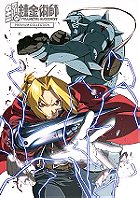 Posted : 14 years, 3 months ago on 12 October 2011 12:45
(A review of Fullmetal Alchemist)
Posted : 14 years, 3 months ago on 12 October 2011 12:45
(A review of Fullmetal Alchemist)Yes, yes, the inevitable comparison between Fullmetal Alchemist series and Fullmetal Alchemist: Brotherhood. (Let's refer to the first series as Fullmetal Alchemist and the second series as just Brotherhood.)
I know that there are a lot of people out there drawing comparisons between the two these days, and dammit, here's one more.
This is a difficult comparison for me. Brotherhood stands out as being the much higher quality anime, with much better animation, better character origins and less glaring plot wholes.
But Fullmetal Alchemist, even with it's sometimes nonsensical parts, has touched me in a much more profound way. Even with its rushed ending and completely different story arc from the source material, Fullmetal Alchemist stands out as being the more emotionally engaging and unique experience. However, I may also be biased because the first series was my first anime that I watched on its original run when I was 11.
While Brotherhood is certainly an emotionally charged, heart-warming series as well, there is something that I can't really explain about the first series that just hits the right chord with me.
One of the things I noticed was that the comedy was much more present in Brotherhood, which, in my opinion, hindered the drama at many points. Granted, it was funny as hell, but really ticked me off at times. From what I understand, this is closer to the source manga in which Edward and Alphonse are much more closed off emotionally and more hesitant to become sentimental compared to the first Fullmetal. While this does follow the original author's intentions, the few moments that break this mold in Fullmetal Alchemist are among some of the most poignent I have ever seen.
The only two major characters that had differences worth discussing are Ed and Al.
The Ed in Fullmetal Alchemist is much more realistically immature and weak at times, though admitedly his cocksure attitude can be more annoying than charming at times. The Ed in Brotherhood is still cocksure, but he is more humorous. Though I think he is stronger-willed in Brotherhood, there's also a part of him that seems more compassionate. But there is also something in him that seems also psyhotic and pathetic. It's difficult to explain, but goes without saying that the Brotherhood Ed has more depth.
What I can't explain with Ed I can definitely pick apart with Al. The main irk I have here is with him. In Fullmetal Alchemist, Al is usually restricted to the "damsel in distress" role. However many times Al needs to be rescued is beyond me, and his main purpose seems to be getting captured and becoming a plot device. His presence is simply frustrating. However, the role he plays in Brotherhood is very obviously different from the get-go. He serves a purpose, and shows himself to be a very strong, knowledgeable opponent while also serving as the compassionate parent-figure, all while only getting himself captured once or twice. Hallelujah.
All of the other characters remain basically the same in both series, and thank the heavens for that. They are all so immersive, well-rounded and 3-D. You WILL cry when one of them dies, even if it is the most ghastly of the baddies.
It may not seem to matter much, but it stood out to me: the music. I am always saying that if Brotherhood had the first series soundtrack, it would be perfect. This is obviously an overstatement, but it gets the point across. The soundtrack in Fullmetal Alchemist is simply beautiful. Almost every track is real orchestra as opposed to midi, and as a sound design nut this is really important to me. While Brotherhood's music is good, it's easily forgettable and even repeatative at times. This made a huge difference in the more emotional scenes, and was sometimes the difference between me bawling my eyes out or barely sheading a tear. The greatest example of this was Hughes's death scene. There was something about the melodramatic piano in Fullmetal Alchemist that just twisted my stomach and prepared me to sob at the following scenes. Brotherhood's music just didn't hit me the same way and I couldn't get quite as emotional.
Of course one of the things I must discuss are the endings to the two series. Obviously massive spoilers are ahead, so be warned.
One of the biggest complaints about Fullmetal Alchemist is the change from source material story to original story about 1/3 of the way through. While this was with consent with the original mangaka, there are a good amount of people who were unhappy with the ending. There were a lot of people that thought the "different dimensions" aspect was strange and contrived, which I can understand. This ending also relies a lot on some noticable plot devices and the occasional plot hole. In addition to all this, some things feel like they were left a little unaddressed and to say the least, the death of the main villain was anti-climactic. In fact, the villian was given very little time at all.
On the other hand, Brotherhood's ending is much more planned out, being foreshadowed as early as the first episode. It was very obvious that it was written out, in detail, from beginning, middle and end, which the first series definitely did not have the advantage of. Because of this, Brotherhood's ending is crisp, paced well, climactic and pretty damn epic. It's interesting and with no plot holes I could see (someone with a knack for finding them could probably find a couple though), and everything came together perfectly.
Now I don't want to give all the points to Brotherhood here, however.
I personally think that Dante was the more interesting villian. Yes, her plan was ill-fated from the beginning, but that just adds to her insane delusion. Just her presence, her ideas and even her past relationship with Hohenheim was just plain haunting. Yet her delusions made her that much less threatening as a bad guy. There wasn't really the feeling that she would destroy any more than our main characters.
Father in Brotherhood was a much more typical villain. There definitely was more tension because what he wanted was massive, which definitely allowed for a much more satisfying climax, but he just lacked that essence of pure evil that Dante had. He didn't have the same drive and manipulative power that made Dante such a convincing psychopath. If the two characters could have been combined, then that would have been a force to be reckoned with.
Now, about the very last episodes. Seriously, spoilers ahead, guys.
It is a strange choice, but I like the overall outcome of Fullmetal Alchemist better. Discount the movie here, I am talking about the ending to episode 52, where I view the series truly ended. Though definitely not a fan pleaser, I thought it was the perfect ending. Intensely bittersweet, but I was not disappointed in the least.
Fullmetal Alchemist ended with the two brothers separated, in two completely different worlds in two completely different dimensions, not knowing for sure if either were even alive. But despite this, the bond between brothers was shown to transcend even DIMENSIONS, and if that isn't inspiring I don't know what is. The message was simply beautiful. Even though it left it much more open-ended, it somehow felt more complete. I was not left feeling like I wanted to demand more, unlike Brotherhood.
Brotherhood's ending definitely satisfied the fan's wants more and was very Shounen in style with everyone living happily ever after, which should have satisfied me. But it just seemed too sugary sweet. Granted, I was esctatic about seeing the EdwardxWinry thing actually GO somewhere, but it wrapped too much up and left too little to the imagination for my tastes.
I know it has sounded like I have been bashing Brotherhood in the ground this entire time, that's definitely not the case. Those are the things I prefer in Fullmetal Alchemist, but the rest I think was done better in Brotherhood. I honestly have a lot of trouble deciding which I like better, and to be honest, my opinions kind of change day to day.
If I were to reccommend one of them, well... I don't know if I could pick. It just depends on the person. I would personally reccommend them both. I might reccommend watching the first series before Brotherhood, simply because the beginning is paced much slower, is 12 episodes shorter and because it's the first chronologically. Brotherhood definitely does not hold your hand in the beginning and while prior knowledge isn't needed, it can be helpful.
All in all, Brotherhood was the more "safe" of the two and definitely outdoes the first in terms of fluidity, plot and overall quality, but Fullmetal Alchemist's daring ideas both hindered it and also created an intensely unique and emotional experience.
 0 comments, Reply to this entry
0 comments, Reply to this entry
Beautiful
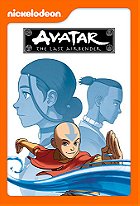 Posted : 14 years, 9 months ago on 11 April 2011 06:20
(A review of Avatar: The Last Airbender)
Posted : 14 years, 9 months ago on 11 April 2011 06:20
(A review of Avatar: The Last Airbender)Nickelodeon went out on a limb when they added this show to their Nicktoons line-up, and luckily for them Avatar is the most respectable, well made cartoon they have ever featured.
When this show first came out when I was in 4th grade back in 2004, I watched the first season religiously. I barely got into the second season because by the time it was released it was suddenly "uncool" to watch cartoons. A few weeks ago, for nostalgia's sake, I picked up the first season to relive my old favorite show. I wasn't expecting much going into it, but I was absorbed by just the second episode. I think I watched the entire season in one day, and bought the other two seasons the next day. OCD is a magnificent thing.
At first I was cautious because I am *NOT* a fantasy-lover. I admit that I usually have trouble enjoying shows with anything fantastic or spiritual, such as, say... flying bison or magic/spiritual water. But I put my hang-ups aside and enjoyed it to the full.
THE GOOD:
The animation is beautifully done for a television budget and the backgrounds deserve special attention for their beauty and detail. From small documentaries and extras, I admire the research done to make the show authentic, from the locations to the caligraphy and especially to the martial arts. True to the idea of bending, the character's movements correspond to the way they move their element, which is easy to see in the animation which flows like water (no pun intended).
The show is legitimately funny and quirky. I was surprised to find no hints of any hidden adult humor, (because those are usually what I find funny in cartoons). The show is good-natured throughout and just generally has a good heart about it.
The characters develop into interesting, three-dimensional personalities with contradictions and hang-ups, occasionally acting wrongly because of their young age or strong emotions. The story contains its fair amount of filler, but it is usually not tiring and advances the plot in some way. And when the plot really gets moving, it's engrossing and exciting.
While it is entertaining for kids, the story is mature and intelligent enough for adults to enjoy, but simple enough for the young ones to understand.
I of course cannot leave out the soundtrack. Comprised mostly of taiko drums, traditional Chinese instruments, western orchesteral instruments and chanting, the music is dynamic, exciting and downright beautiful. While the orchesteral music is unique enough to include in a children's cartoon, the soundtrack is always expressive, imaginative and unique in itself. I hope for an original soundtrack, because I would love to listen to it in my free time.
All in all I am so impressed at the extraordinary effort put into this show. The sheer amount of work and pride the creators have is present in every scene.
THE BAD:
Here's the part where I nit-pick.
Because of the intended audience (6-11 year olds) I was more willing to dismiss the times when things got a tad far-fetched. Firmly logic based people like me may feel that some of the ideas or spirituality expressed are silly, but I just told myself "you just saw a magical kid flying on a bison" and I shake it off.
Some scenes had moments bordering on melodramatic, but it only ruined the effect for a few seconds before I was engrossed again.
Like I mentioned, there is filler. I know some people are really bothered by filler, and understandably so. I've never really cared, personally. There are a few moments that really irked me and I desperately wanted the story to continue (like when Appa gets kidnapped in the desert). Most of the filler advances the story in one way or another, though.
In some of the action sequences the director chose one long shot, which showed some characters just standing in the background not doing anything, distracting from the scene. This improved over the series when the director learned to do several close shots of the action rather than panning and exposing the entire battlefield to reveal all the gaps.
But these are all such small things that I usually didn't notice much.
When this show first came out when I was in 4th grade back in 2004, I watched the first season religiously. I barely got into the second season because by the time it was released it was suddenly "uncool" to watch cartoons. A few weeks ago, for nostalgia's sake, I picked up the first season to relive my old favorite show. I wasn't expecting much going into it, but I was absorbed by just the second episode. I think I watched the entire season in one day, and bought the other two seasons the next day. OCD is a magnificent thing.
At first I was cautious because I am *NOT* a fantasy-lover. I admit that I usually have trouble enjoying shows with anything fantastic or spiritual, such as, say... flying bison or magic/spiritual water. But I put my hang-ups aside and enjoyed it to the full.
THE GOOD:
The animation is beautifully done for a television budget and the backgrounds deserve special attention for their beauty and detail. From small documentaries and extras, I admire the research done to make the show authentic, from the locations to the caligraphy and especially to the martial arts. True to the idea of bending, the character's movements correspond to the way they move their element, which is easy to see in the animation which flows like water (no pun intended).
The show is legitimately funny and quirky. I was surprised to find no hints of any hidden adult humor, (because those are usually what I find funny in cartoons). The show is good-natured throughout and just generally has a good heart about it.
The characters develop into interesting, three-dimensional personalities with contradictions and hang-ups, occasionally acting wrongly because of their young age or strong emotions. The story contains its fair amount of filler, but it is usually not tiring and advances the plot in some way. And when the plot really gets moving, it's engrossing and exciting.
While it is entertaining for kids, the story is mature and intelligent enough for adults to enjoy, but simple enough for the young ones to understand.
I of course cannot leave out the soundtrack. Comprised mostly of taiko drums, traditional Chinese instruments, western orchesteral instruments and chanting, the music is dynamic, exciting and downright beautiful. While the orchesteral music is unique enough to include in a children's cartoon, the soundtrack is always expressive, imaginative and unique in itself. I hope for an original soundtrack, because I would love to listen to it in my free time.
All in all I am so impressed at the extraordinary effort put into this show. The sheer amount of work and pride the creators have is present in every scene.
THE BAD:
Here's the part where I nit-pick.
Because of the intended audience (6-11 year olds) I was more willing to dismiss the times when things got a tad far-fetched. Firmly logic based people like me may feel that some of the ideas or spirituality expressed are silly, but I just told myself "you just saw a magical kid flying on a bison" and I shake it off.
Some scenes had moments bordering on melodramatic, but it only ruined the effect for a few seconds before I was engrossed again.
Like I mentioned, there is filler. I know some people are really bothered by filler, and understandably so. I've never really cared, personally. There are a few moments that really irked me and I desperately wanted the story to continue (like when Appa gets kidnapped in the desert). Most of the filler advances the story in one way or another, though.
In some of the action sequences the director chose one long shot, which showed some characters just standing in the background not doing anything, distracting from the scene. This improved over the series when the director learned to do several close shots of the action rather than panning and exposing the entire battlefield to reveal all the gaps.
But these are all such small things that I usually didn't notice much.
 0 comments, Reply to this entry
0 comments, Reply to this entry
I wish I could like it
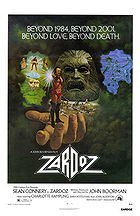 Posted : 14 years, 10 months ago on 6 March 2011 06:45
(A review of Zardoz)
Posted : 14 years, 10 months ago on 6 March 2011 06:45
(A review of Zardoz)I admit it, I do not understand this movie. I whole-heartedly wish I could, but I can't. Just when I feel like I've grasped what it's trying to say, I lose it again. I don't know if it's because I'm not philosophical enough, not smart enough, or maybe the movie really is a bunch of nonsense. I have no clue. All I can say is that this is really a bizarre, strange movie.
If someday I could understand this movie, I think I would love it. But even though it was mostly gibberish to me, I thought it was genuinely interesting with really interesting visuals and ideas.
It's camp sometimes and it certainly hasn't aged well (Sean Connery in an orange thong, for example), but I enjoyed watching it. When I wasn't trying to scour for some deep message, I loved its sheer goofiness.
My brother and I first watched it because we had heard about its crazy B-movie campiness and we expected exactly that. And we got that for the first 30 minutes, until we started to get into it and made an effort to understand what it was saying. When we couldn't understand what it was saying, he stopped watching and I pressed on.
I honestly don't think I'll understand this movie until someone word for word explains every scene of this film, but I always watch it for a spark of creativity when I need inspiration to paint. The visuals are dreamy and mesmerizing, and genuinely beautiful in some parts.
To make a long review short, Zardoz makes no sense to me but it does its part by standing out among other Sci-Fi films (for better of for worse) and cementing itself in my brain forever. I can honestly say that I'll probably never forget watching this. It was that bizarre.
If someday I could understand this movie, I think I would love it. But even though it was mostly gibberish to me, I thought it was genuinely interesting with really interesting visuals and ideas.
It's camp sometimes and it certainly hasn't aged well (Sean Connery in an orange thong, for example), but I enjoyed watching it. When I wasn't trying to scour for some deep message, I loved its sheer goofiness.
My brother and I first watched it because we had heard about its crazy B-movie campiness and we expected exactly that. And we got that for the first 30 minutes, until we started to get into it and made an effort to understand what it was saying. When we couldn't understand what it was saying, he stopped watching and I pressed on.
I honestly don't think I'll understand this movie until someone word for word explains every scene of this film, but I always watch it for a spark of creativity when I need inspiration to paint. The visuals are dreamy and mesmerizing, and genuinely beautiful in some parts.
To make a long review short, Zardoz makes no sense to me but it does its part by standing out among other Sci-Fi films (for better of for worse) and cementing itself in my brain forever. I can honestly say that I'll probably never forget watching this. It was that bizarre.
 0 comments, Reply to this entry
0 comments, Reply to this entry
Brilliant
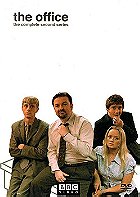 Posted : 14 years, 10 months ago on 6 March 2011 05:20
(A review of The Office (UK))
Posted : 14 years, 10 months ago on 6 March 2011 05:20
(A review of The Office (UK))I don't meet a lot of fellow Americans that have even seen the original, which I think is a shame. I actually have not watched much of the American version, so this is not a review to slam the American version or to compare the two, thank God.
The Office is an easy show to watch and get into at only 12 episodes and two specials, but it goes through so much character development and story in such a short period. I was caught off guard by the touching drama that seemed to pop in once in a while, but it felt real and unforced like many television shows I have seen.
I enjoyed how natural and familiar the setting and characters were in the show. I could see the characters as real people working in a real office. The jokes are subtle and usually based on an awkward situation going out of control (using started by Gareth or David), and making that awkwardness both familiar and hysterical. I was constantly in hysterics while watching, which is embarrassing because I have a laugh not unlike Ricky Gervais...
Naturally, I think the best part of the show is the main character, David Brent, a sort of boss from hell. While he is painfully funny and awkward, I was surprised at how sympathetic I was to his character. David Brent is narcissistic, ignorant and passive aggressive, but seems to be so because of his insecurity in himself. He plays for the cameras and tries hard to be the funny, laid back boss, but when caught naturally, he relaxes and shows himself to be a self conscious, lonely, sad man with a surprisingly sweet side. A lot of people label him as an asshole, which I think is true in some way, but I think David is a sincere, if not misguided, man who just wants the best for his team and the best for himself.
(Of course, those are just my thoughts on the character. I've heard lots of different opinions on David Brent.)
Phew, I went off on a tangent there.
It was refreshing to see some three dimensional characters in a television comedy for once. While other good shows like The Big Bang Theory and Modern Family, for example, have funny and likable characters, I doubt I could write as much as I just did about David Brent if I were asked to write about, say, Howard Wolowitz from Big Bang Theory.
tl;dr, The Office is a brilliantly done, realistically portrayed mockumentary with relatable characters, a great setting and atmosphere, and most importantly, it's hysterically funny. An amazing show done by my two favorite comedians.
The Office is an easy show to watch and get into at only 12 episodes and two specials, but it goes through so much character development and story in such a short period. I was caught off guard by the touching drama that seemed to pop in once in a while, but it felt real and unforced like many television shows I have seen.
I enjoyed how natural and familiar the setting and characters were in the show. I could see the characters as real people working in a real office. The jokes are subtle and usually based on an awkward situation going out of control (using started by Gareth or David), and making that awkwardness both familiar and hysterical. I was constantly in hysterics while watching, which is embarrassing because I have a laugh not unlike Ricky Gervais...
Naturally, I think the best part of the show is the main character, David Brent, a sort of boss from hell. While he is painfully funny and awkward, I was surprised at how sympathetic I was to his character. David Brent is narcissistic, ignorant and passive aggressive, but seems to be so because of his insecurity in himself. He plays for the cameras and tries hard to be the funny, laid back boss, but when caught naturally, he relaxes and shows himself to be a self conscious, lonely, sad man with a surprisingly sweet side. A lot of people label him as an asshole, which I think is true in some way, but I think David is a sincere, if not misguided, man who just wants the best for his team and the best for himself.
(Of course, those are just my thoughts on the character. I've heard lots of different opinions on David Brent.)
Phew, I went off on a tangent there.
It was refreshing to see some three dimensional characters in a television comedy for once. While other good shows like The Big Bang Theory and Modern Family, for example, have funny and likable characters, I doubt I could write as much as I just did about David Brent if I were asked to write about, say, Howard Wolowitz from Big Bang Theory.
tl;dr, The Office is a brilliantly done, realistically portrayed mockumentary with relatable characters, a great setting and atmosphere, and most importantly, it's hysterically funny. An amazing show done by my two favorite comedians.
 0 comments, Reply to this entry
0 comments, Reply to this entry
Not worth it
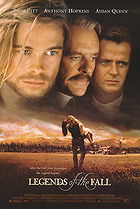 Posted : 15 years, 1 month ago on 20 December 2010 04:56
(A review of Legends of the Fall)
Posted : 15 years, 1 month ago on 20 December 2010 04:56
(A review of Legends of the Fall)Personally, I thought it was terrible. There didn't seem to be any point to it all. I had no sympathy for any of the characters and could not force myself to feel anything for them no matter how I tried. I searched for any redeeming qualities and couldn't find anything. The movie was simply miserable to watch and I still cannot grasp what the director was meaning to say with this film. It doesn't make a lot of sense to me.
 0 comments, Reply to this entry
0 comments, Reply to this entry
Very surprised
 Posted : 15 years, 4 months ago on 12 September 2010 04:20
(A review of The Poor Little Rich Girl (1917))
Posted : 15 years, 4 months ago on 12 September 2010 04:20
(A review of The Poor Little Rich Girl (1917))This was actually my first Mary Pickford film and I am very surprised. All of the performances were great, but Mary so effortlessly portrays a little girl, and she's spot-on. I almost forgot she was a woman of 25! She perfectly captures the nativity, innocence and mischief of a 10 year old girl better than a real little girl could have. She's a joy to watch on screen.
The best part of the film is the dreamland scene. It is so surreal and imaginative, and captures the spirit of a child's wild dreams so well that it brought back memories from my own childhood.
The entire film flows like water. It never felt disjointed at all, and I never felt the pacing was too fast or too slow.
It's a very fun, imaginative, creative and touching film that I really enjoyed watching. I am happy that I can call this my first Pickford movie.
The best part of the film is the dreamland scene. It is so surreal and imaginative, and captures the spirit of a child's wild dreams so well that it brought back memories from my own childhood.
The entire film flows like water. It never felt disjointed at all, and I never felt the pacing was too fast or too slow.
It's a very fun, imaginative, creative and touching film that I really enjoyed watching. I am happy that I can call this my first Pickford movie.
 0 comments, Reply to this entry
0 comments, Reply to this entry
Pleasantly surprised
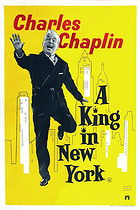 Posted : 15 years, 5 months ago on 31 July 2010 03:45
(A review of A King in New York)
Posted : 15 years, 5 months ago on 31 July 2010 03:45
(A review of A King in New York)The Good:
Upon my first impression, the movie seems quite silly. But under all the silliness of plastic surgery, rock'n'roll, fire hoses and sexual innuendo is a very intelligent satire of blatant commercialism and, yes, communism. (Chaplin himself claimed this was not a political film, but the attacks on McCarthyism and his own bitterness over his American exile are obvious.) His opinions on television and advertisements are venomous, which I adore. Despite being 53 years old, I agree with much of it; It still applies very much to our world dominated by commercialism.
The gags are very unlike most of Chaplin's other work, but I honestly laughed until I cried at many of them. Definitely much dirtier and spiteful than some of his other movies.
The Bad:
Chaplin was unable to use his usual crew and studios due to his being barred from the United States, where Chaplin Studios was located. Because of money restrictions, he was unable to do his usual routine of making movies: doing take after take until it was absolutely perfect. Every minute was money wasted.
The film was shot in 10 weeks, a record time for the (sometimes obsessively) perfectionist Chaplin. Because of this, the lighting is somewhat shotty, and the whole film could have benefited from a good editor. Occasionally the transitional scenes are a real slap in the face because of how abrupt they are.
Overall:
An underrated Chaplin film. While it certainly doesn't rank among his best, it is an incredibly funny satirical comedy. It definitely has a bad reputation among Chaplin fans, but I was delighted to watch it and discover a funny and sometimes absolutely brilliant film.
(Because let's face it, saying it's the worst Chaplin film is like saying "This bacon isn't very good." It might not be AS good, but it's still delicious. Sorry for that analogy, it makes no sense. Perhaps if Chaplin had taken his name off the film it would be received better.)
 0 comments, Reply to this entry
0 comments, Reply to this entry
The Sheik review
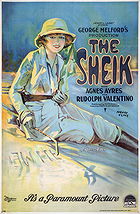 Posted : 15 years, 6 months ago on 18 July 2010 08:28
(A review of The Sheik)
Posted : 15 years, 6 months ago on 18 July 2010 08:28
(A review of The Sheik)The good:
Rudolph Valentino is stunning, gorgeous, sexy, beautiful, etc., etc. Honestly, that IS the best part of the film (coming from a woman, that is).
The romance is of course the important part, which the film masters. Valentino and Ayres (once she gets over the whole "getting kidnapped" deal) share a heart-melting, dramatic romance in lavishly decorated Arabian sets and costumes. Every inch of each shot is beautifully decorated.
The not so good:
While Rudy is an undeniably charasmatic personality (who I did love as Ahmed), he occasionally overacted, as many of the other actors did as well. However, it is not enough to distract from the drama of the story.
Lady Diana's quick change from despising the man who kidnaps her to slavish love is very unlikely and somewhat jarring. While I understand her reasoning, I thought it could have flowed better if this kind of huge character development happened gradually.
Overall...
I very much enjoyed the film, and I definitely recommend it to Valentino fans, silent film fans, and romance fans. While I personally don't believe it to be a masterpiece, it is a well done movie.
 0 comments, Reply to this entry
0 comments, Reply to this entry
 Login
Login
 Home
Home 21 Lists
21 Lists 10 Reviews
10 Reviews Collections
Collections